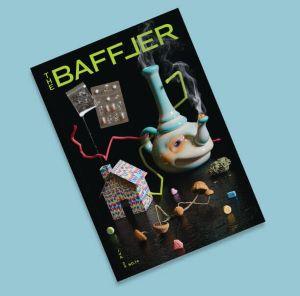Our first-ever magazine review. This smart and scrappy rag has earned it.

Chronicle Magazine Review: The Baffler, No. 74, Altered States (June 2024,136 pp., $14 PB)
Writing about drugs and drug policy doesn't have to come from academic presses or book-length journalistic reportage. Maia Szalavitz writes consistently cogent and well-informed short pieces on various aspects of drug policy as a contributing opinion writer for The New York Times. And well-respected periodicals such as The Atlantic, Harper's, the New Republic, and the New Yorker, among others, have contributed invaluable article-length reporting on drug topics over the years.
And then there's The Baffler. Founded in 1988 by progressive journalists Thomas Frank (of "What's The Matter with Kansas?" fame) and Keith White, the feisty magazine has produced punchy social, cultural, and political reporting and smartly written analysis from the left side of the spectrum ever since. The rag has covered drug-related topics off and on from the beginning, but now it has produced an entire issue on the world of dope, and it's good, thought-provoking stuff.
Some of it is a bit on the esoteric side, as with "K-Pop: Our Forefathers Did Disassociatives," journalist Dan Piepenbring's examination of the current fascination with ketamine in light of the 19th Century use of ether and nitrous oxide and the never-ending pursuit of profound, but sadly fleeting, enlightenment. Likewise, writer and translator Dylan Levi King's "Sinopharmacology: Psychonauts with Chinese Characteristics," takes the reader on a tour of the Chinese recreational drug scene, a fascinating excursion through an alien land.
But some of it strikes closer to home, such as Baltimore writer and author Baynard Wood's examination of tensions between supporting organized labor and supporting moves toward social equity in Maryland's legal marijuana business. He also has a thing or two to say about working conditions in the "glamorous" cannabis industry in "High Expectations: Budding labor tensions in the cannabis industry."
And given the ongoing drug overdose crisis, it is no surprise that opioid policy generates two articles, with Chicago journalist Zachary Siegel taking on the framing of repeated "epidemics" in "Permanent Crisis: Myopic responses perpetuate the 'opioid epidemic,'" and finding much wanting. Meanwhile, author Ann Neumann makes the case that we continue to demonize opioid pain patients at the cost of much human suffering and indignity in "Pain and Suffering: Demonizing opioids has unintended consequences."
But wait, there's more: In "A Drug Against War: The Militarization of Ecstasy," Philadelphia writer John Semley examines the tensions and contradictions of attempting to bring psychedelic therapies to the public in concert with venture capitalists as he charts Lykos Therapeutics' (formerly known as the Multidisciplinary Association for Psychedelic Studies' Public Benefit Corporation) path to getting Ecstasy approved for PTSD treatment by the FDA. The article was published just before an FDA panel recommended rejecting the application, which adds a different tinge to it now. Semley also examines the ironies of military veterans becoming the spearhead of the push for therapeutic psychedelics, especially given the national security complex's history of attempting to use various substances for nefarious purposes.
And journalist, author, and CUNY professor Osvaldo Zavala does a brilliant skewering of the mythical collaboration between Hamas and the Sinaloa Cartel on tunnel construction techniques. A claim that rises up periodically from a former Israeli military officer who has a company peddling border security products, it is a compelling propaganda effort, bringing together two of contemporary America's scariest bogeymen. Zavala gleefully demolishes the claim and its ideological underpinnings in "Tunnel Vision: Notes from the Underground, from Sinaloa to Gaza."
And there's some bonus, non-drug material as well, including a piece on George Santos and the end times, another piece on the cultural history of McGruff the crime dog, and various poems scattered about, including "Ording a casket from Amazon Prime."
If you're a drug policy wonk and ever needed a reason to pick up The Baffler, this is it. Or if you're just a fan of good writing on contemporary culture, hey, another issue of The Baffler is on the newsstands now.
This work by StoptheDrugWar.org is licensed under Creative Commons Attribution-ShareAlike 4.0 International
Add new comment